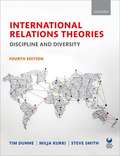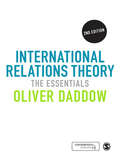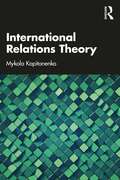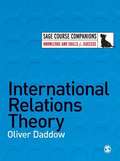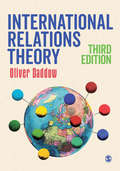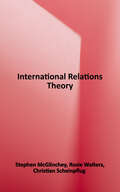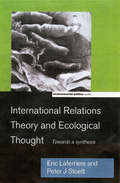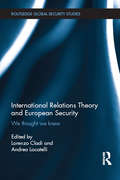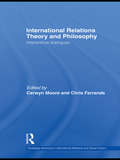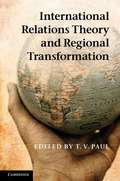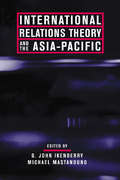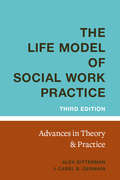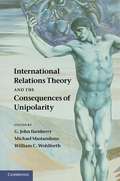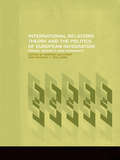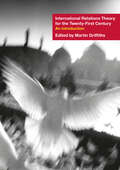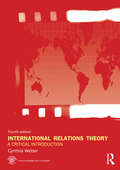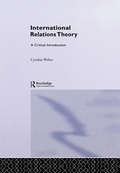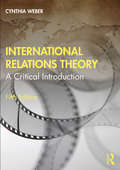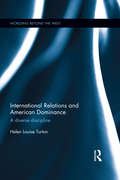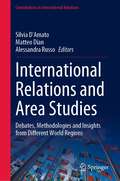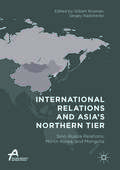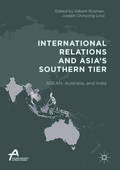- Table View
- List View
International Relations Theories: Discipline and Diversity (Fourth Edition)
by Steve Smith Tim Dunne Milja KurkiBringing together the most influential scholars in the field, International Relations Theories: Discipline and Diversity provides unrivalled coverage of international relations theories and arguments. This best-selling text explores the full spectrum of theoretical perspectives and debates, ranging from the historically dominant traditions of realism, liberalism, and Marxism to postcolonialism and green theory. Each chapter is dedicated to a particular theory and features a case study that bridges theory and practice, showing how theory can be used to explain real world political dilemmas. Spotlights on key books and articles encourage readers to go beyond the textbook and explore important works in the field, and new case study questions encourage analytical thinking and help readers understand the value of applying theory to concrete political problems.
International Relations Theory
by Dr Oliver DaddowInternational Relations Theory: The Essentials provides a complete and concise introduction to the study of international relations theory, covering the main theories that you'll encounter on your course. In addition, its helpful study skills section shows you how to apply your knowledge to coursework and examinations, ensuring that you get the most out of your studies. This revised second edition includes: Coverage of the key theories in international relations, including new sections on Democratic Peace Theory, Pluralism and Solidarism and Norms An updated study skills section giving you guidance on responding to feedback and avoiding plagiarism, along with hints and tips for good essay writing, how to get the most out of lectures and seminars, and exam preparation A number of useful learning features; from 'questions to ponder' and 'common pitfalls', to lists of further reading and 'taking it further' boxes, which suggest ways in which you can extend your thinking beyond the classroom Written in a clear and accessible style, International Relations Theory: The Essentials is the perfect primer for both undergraduate and graduate students new to the topic of international relations theory, or for those simply looking for a refresher.
International Relations Theory
by Mykola KapitonenkoThis textbook shows how to think about international relations and offers insights into its most important theories and issues.Written from beyond the Anglo-US academic environment, with attention to regional nuances, it teaches students to perceive international politics in an organized and theoretical way, thus helping them grasp the complexity of the subject and see simple ways of making sense of it. Providing a thorough introduction to the main theories and approaches to international relations, the book covers the main dilemmas, concepts and methodological issues alongside a number of neglected theoretical paradigms such as institutionalism, Marxism, critical approaches, feminism and power in world politics.It will be of great use as a main textbook as well as a supplementary guide for related courses, including Foreign Policy Analysis, Conflict Studies, Security Studies, History of International Relations, International Organizations and Global Governance.
International Relations Theory
by Oliver DaddowSAGE Course Companions provide students with an insider's guide into how to make the most of their undergraduate courses and extend their understanding of the key concepts covered. Ideal for anyone new to the study of international relations or looking for a refresher, this Course Companion includes a comprehensive introduction to the competing theories at the heart of the discipline as well as hints and tips on how to apply them when tackling coursework or examinations. Written in a straightforward and clear style, it is designed to augment, rather than replace, existing textbooks for the course and provides: o pointers to success in course exams and written assessment exercises; o easy access to the key theories in international relations; o guidance on the essential study skills required to pass the course; o help with developing critical thinking; o 'taking it further' sections that suggest how readers can extend their thinking beyond the received wisdom.
International Relations Theory
by Oliver DaddowWith chapters on all the major theories of international relations, accompanied by contemporary examples from popular culture, film and literature, this Third Edition is the ideal introduction to the key perspectives in the field. Key features: 30% new content, with all chapters revised and updated Useful learning features including further reading, 'questions to ponder', 'common pitfalls' and 'taking it further' boxes, to help you extend your thinking beyond the classroom Invaluable chapters on getting the best out of your knowledge of International Relations Theory in essays and exams, including real life examples of best practice.
International Relations Theory
by Oliver DaddowWith chapters on all the major theories of international relations, accompanied by contemporary examples from popular culture, film and literature, this Third Edition is the ideal introduction to the key perspectives in the field. Key features: 30% new content, with all chapters revised and updated Useful learning features including further reading, 'questions to ponder', 'common pitfalls' and 'taking it further' boxes, to help you extend your thinking beyond the classroom Invaluable chapters on getting the best out of your knowledge of International Relations Theory in essays and exams, including real life examples of best practice.
International Relations Theory (E-IR Foundations)
by Stephen McGlinchey Rosie Walters Christian ScheinpflugThis book is designed as a foundational entry point to International Relations theory. As a beginner’s guide, it has been structured to condense the most important information into the smallest space and present that information in an accessible manner. Like other books in the E-IR Foundations series, this takes the form of an engaging narrative, connecting the reader directly to the issues at hand. <p><p>The first half of the book covers the theories that are most commonly taught in undergraduate programmes. The book then expands to present emerging approaches and offer wider perspectives. Each chapter sets out the basics of a theory whilst also applying it to a real-world event or issue, creating a lively, readable and relevant guide that will help students to see not only what theories are – but why they matter. <p><p>Contributors: Victor Adetula, Amitav Acharya, Sandrina Antunes, Lina Benabdallah, Isabel Camisão, Irena Leisbet Ceridwen Connon, Jeff Corntassel, Alix Dietzel, Hugh C. Dyer, Clara Eroukhmanoff, Marcos Farias Ferreira, Dana Gold, Richard Ned Lebow, Aishling Mc Morrow, Jeffrey W. Meiser, Carlos Murillo-Zamora, Sheila Nair, Maïa Pal, Alex Prichard, Felix Rösch, Archie W. Simpson, Sarah Smith, Yannis A. Stivachtis, Sarina Theys, Markus Thiel, Marc Woons and Pichamon Yeophantong. <p><p>Reviews:“This is a superb book. It offers a comprehensive listing that is imaginatively presented and enormously accessible. Helpfully, too, it takes the form of a global conversation. IR theory at its sparkling best.”– Peter Vale, Professor of Humanities, University of Johannesburg and Nelson Mandela Professor of Politics Emeritus, Rhodes University. <p><p>“In the plethora of textbooks on IR almost none depart from 'playing it safe', giving forms of instruction in the rudiments of established theories. The great breakout of this volume is its entire second half of proposing quite radical new ways of looking at the world. The book is both 'safe' and 'unsafe' and in both it is sometimes witty in a way that students will savour – learning what IR is, and what it could be. A lovely book.”– Stephen Chan OBE, Professor of World Politics, School of Oriental & African Studies, University of London.
International Relations Theory and Ecological Thought: Towards a Synthesis (Environmental Politics)
by Eric Laferrière Peter J. StoettEcological crises have never been higher on the international political agenda. However, ecological thought and international relations theory have developed as separate disciplines. This ground-breaking study looks at the relationship between ecological thought and international relations theory arguing that there are shared concerns: peace, co-operation and security. The authors ask what ecological crisis can teach IR theorists as well as what ecological perspectives have been adopted by governments and international NGOs.
International Relations Theory and European Security: We Thought We Knew (Routledge Global Security Studies)
by Andrea Locatelli Lorenzo CladiThis book engages with key contemporary European security issues from a variety of different theoretical standpoints, in an attempt to uncover the drivers of foreign policy and defence integration in the EU. Although European foreign policy has been attracting an ever-increasing number of International Relations (IR) scholars since the end of the Cold War, consensus on what drives European foreign policy integration has not yet emerged. This book seeks to encourage debate on this issue by examining a wide range of high-profile security issues which have roused significant interest from policy makers, academics and the public in recent years. The volume discusses, amongst other issues, the strategic posture of the European Union as a security actor, the troubled relationship with Russia, the debate regarding France’s relations with the US following France’s rapprochement with NATO and the EU’s influence in the Israeli-Palestinian conflict. The collective intent of the contributors to highlight the drivers of EU foreign policy and defence integration ties together the wide variety of topics covered in this volume, forming it into a comprehensive overview of this issue. By paying considerable attention not just to the internal drivers of EU cooperation, but also to the critical role played by the US as an incentive or obstacle to European security, this book presents a unique contribution to this field of debate. This book will be of much interest to students of European security, IR theory, Transatlantic Relations, European politics and EU foreign policy.
International Relations Theory and Philosophy: Interpretive dialogues (Routledge Advances in International Relations and Global Politics)
by Cerwyn MooreThis book discusses the contribution of philosophers and thinkers whose ideas have recently begun to permeate international relations theory. It provides an introduction to the contemporary debates regarding theories and methodologies used to study international relations, particularly the relationships between interpretive accounts of social action, European philosophical traditions, hermeneutics and the discipline of international relations. The authors provides a platform for dialogue between theorists and researchers engaged in a more specific area studies, geo-political studies, political theory and historical accounts of international politics. The volume analyzes a variety of theoretical and explores the work of Nietzsche, Heidegger, Gramsci, Wittgenstein, Gadamer, Levinas, Bakhtin, Patocka, Derridean, Deleuze and Susan Sontag. Making an important contribution to discussions about how to study the complexities of world politics, this book will be of interest to students and researchers of international relations, politics, sociology, philosophy and political theory.
International Relations Theory and Regional Transformation
by T. V. PaulRegional transformation has emerged as a major topic of research during the past few decades, much of it seeking to understand how a region changes into a zone of conflict or cooperation and how and why some regions remain in perpetual conflict. Although the leading theoretical paradigms of international relations have something to say about regional order, a comprehensive treatment of this subject is missing from the literature. This book suggests that cross-paradigmatic engagement on regional orders can be valuable if it can generate theoretically innovative, testable propositions and policy-relevant ideas. The book brings together scholars from the dominant IR perspectives aiming to explain the regional order issue through multidimensional and multi-causal pathways and seeking meeting points between them. Using insights from IR theory, the contributors offer policy-relevant ideas which may benefit conflict-ridden regions of the world.
International Relations Theory and the Asia-Pacific
by Michael Mastanduno G. John. Ikenberry Eds.What will the Asia-Pacific rim look like in the years ahead? What tools will international relations theorists need to understand the complex relationship among China, Japan, and the United States as the three powers shape the economic and political future of this crucial region?Some of the best and most innovative scholars in international relations and Asian area studies gather here with the working premise that stability in the broader Asia-Pacific region is in large part a function of the behavior of, and relationships among, these three major powers. Each author analyzes the foreign policy behavior of one or more of these states and/or relations among them in an effort to make claims about the prospects for regional stability. Some of the chapters focus on security relationships, some on economic relations, and some on the interaction of the two. The authors do not promote any particular theoretical perspective, but instead draw on the full diversity of theoretical approaches in contemporary international relations scholarship to illuminate international interactions among the Pacific powers.The creative collaboration of international relations and Asian studies specialists presents the opportunity to assess the applicability of Western categories of analysis to the beliefs and behaviors of Asian actors. The scholars in this volume share the conviction that a deeper understanding of the effects of cultural divides between Asian and American policymakers is essential if the Pacific rim's economic and regional security is to be safeguarded.
International Relations Theory and the Asia-Pacific
by G. John Ikenberry Michael MastandunoWhat will the Asia-Pacific rim look like in the years ahead? What tools will international relations theorists need to understand the complex relationship among China, Japan, and the United States as the three powers shape the economic and political future of this crucial region? Some of the best and most innovative scholars in international relations and Asian area studies gather here with the working premise that stability in the broader Asia-Pacific region is in large part a function of the behavior of, and relationships among, these three major powers. Each author analyzes the foreign policy behavior of one or more of these states and/or relations among them in an effort to make claims about the prospects for regional stability. Some of the chapters focus on security relationships, some on economic relations, and some on the interaction of the two. The authors do not promote any particular theoretical perspective, but instead draw on the full diversity of theoretical approaches in contemporary international relations scholarship to illuminate international interactions among the Pacific powers. The creative collaboration of international relations and Asian studies specialists presents the opportunity to assess the applicability of Western categories of analysis to the beliefs and behaviors of Asian actors. The scholars in this volume share the conviction that a deeper understanding of the effects of cultural divides between Asian and American policymakers is essential if the Pacific rim's economic and regional security is to be safeguarded.
International Relations Theory and the Asia-Pacific
by Michael Mastanduno G. John. IkenberryWhat tools will international relations theorists need to understand the complex relationship among China, Japan, and the United States as the three powers shape the economic and political future of this crucial region? Some of the best and most innovative scholars in international relations and Asian area studies gather here with the working premise that stability in the broader Asia-Pacific region is in large part a function of the behavior of, and relationships among, these three major powers.
International Relations Theory and the Consequences of Unipolarity
by G. John Ikenberry Michael Mastanduno William C. WohlforthThe end of the Cold War and subsequent dissolution of the Soviet Union resulted in a new unipolar international system that presented fresh challenges to international relations theory. Since the Enlightenment, scholars have speculated that patterns of cooperation and conflict might be systematically related to the manner in which power is distributed among states. Most of what we know about this relationship, however, is based on European experiences between the seventeenth and twentieth centuries, when five or more powerful states dominated international relations, and the latter twentieth century, when two superpowers did so. Building on a highly successful special issue of the leading journal World Politics, this book seeks to determine whether what we think we know about power and patterns of state behaviour applies to the current 'unipolar' setting and, if not, how core theoretical propositions about interstate interactions need to be revised.
International Relations Theory and the Politics of European Integration: Power, Security and Community
by Michael C. Williams Morten KelstrupInternational Relations Theory and the Politics of European Integration focuses on the roles of community, power and security, within the European Union. It features contributions from highly respected international scholars, and covers subjects such as:· sovereignty and European integration · the EU and the politics of migration· the internationalisation of military security · the EU as a security actor · money, finance and power · the quest for legitimacy with regards to EU enlargement.
International Relations Theory for the Twenty-First Century: An Introduction
by Martin GriffithsInternational relations theory has been the site of intense debate in recent years. A decade ago it was still possible to divide the field between three main perspectives – Realism, Liberalism, and Marxism. Not only have these approaches evolved in new directions, they have been joined by a number of new ‘isms’ vying for attention, including feminism and constructivism. International Relations Theory for the Twenty-First Century is the first comprehensive textbook to provide an overview of all the most important theories within international relations. Written by an international team of experts in the field, the book covers both traditional approaches, such as realism and liberal internationalism, as well as new developments such as constructivism, poststructuralism and postcolonialism. The book’s comprehensive coverage of IR theory makes it the ideal textbook for teachers and students who want an up-to-date survey of the rich variety of theoretical work and for readers with no prior exposure to the subject.
International Relations Theory: A Critical Introduction
by Cynthia WeberThe fourth edition of this innovative textbook introduces students to the main theories in international relations. It explains and analyzes each theory, allowing students to understand and critically engage with the myths and assumptions behind them. Each theory is illustrated using the example of a popular film. Key features of this textbook include: Discussion of all the main theories: realism and neo-realism, idealism and neo-idealism, liberalism, constructivism, postmodernism, gender, globalization, environmentalism, anarchism A new chapter on anarchism, debt and the Occupy Movement including use of the film, The Hunger Games New chapter brings the textbook up to date with reflections on the 2008 Global Financial Crisis and reactions to it by focusing on the myth this crisis generated, ‘We are the 99%’ Innovative use of narratives from films that students will be familiar with: Lord of the Flies, Independence Day, Wag the Dog, Fatal Attraction, The Truman Show, East is East, Memento, WALL-E and The Hunger Games Accessible and exciting writing style which is well-illustrated with film stills in each chapter, boxed key concepts and guides to further reading. This breakthrough textbook has been designed to unravel the complexities of international relations theory in a way that gives students a clearer idea of how the theories work, and of the myths associated with them.
International Relations Theory: A Critical Introduction
by Cynthia WeberInternational Relations Theory: A Critical Introduction is an innovative new textbook, which introduces students to the main theories in International Relations. It also deconstructs each theory allowing students not only to understand them, but also to critically engage with the assumptions and myths that underpin them. It does this by using five familiar films as tools for first understanding each theory and then for understanding the myths that make them so persuasive for some people.Key features of this textbook include:* coverage of the main theories and traditions including: Realism & Neo-realism; Idealism and Neo-idealism; Liberalism; Constructivism; Postmodernism; Gender; Globalisation and the 'End of History'* innovative use of narratives from five famous films that students will be familiar with: Lord of the Flies; Independence Day; Wag the Dog; Fatal Attraction; and The Truman Show* clearly written, providing students with boxed key concepts, guides to further reading and thinking.This breakthrough textbook has been designed to unravel the complexities of International Relations theory in a way that allows students a clearer idea of how the theories work and some of the myths that are associated with them.
International Relations Theory: A Critical Introduction
by Cynthia WeberThe fifth edition of this innovative textbook introduces students to the main theories in International Relations. It explains and analyzes each theory, allowing students to understand and critically engage with the myths and assumptions behind them. Each theory is illustrated using the example of a popular film. Key features of this textbook include: Discussion of all the main theories: realism and neorealism, idealism and neoidealism, liberalism, constructivism, postmodernism, gender, globalization, neo-Marxism, modernization and development theory, environmentalism, anarchism, and queer theory. A new chapter focused on global LGBT (lesbian, gay, bisexual, and trans) theory and queer theory, Hillary Clinton’s policy myth that "gay rights are human rights and human rights are gay rights," and the film Love is Strange. Innovative use of narrative from films that students will be familiar with: Lord of the Flies, Independence Day, Wag the Dog, Fatal Attraction, The Truman Show, East Is East, Memento, WALL-E, The Hunger Games, and Love is Strange. An accessible and exciting writing style, boxed key concepts, and guides for further reading. A comprehensive Companion Website featuring a complete set of lectures for every major theory and film covered in the textbook, additional workshop and seminar exercises, slides to accompany each lecture, and an extensive bank of multiple-choice, short-answer, and essay questions and answers for every chapter. This breakthrough textbook has been designed to unravel the complexities of international relations theory in a way that gives students a clearer idea of how the theories work, and of the myths associated with them.
International Relations Theory: The Game-Theoretic Approach
by Andrew H. KyddWritten for advanced undergraduate and graduate students, this is the first textbook on international relations theory to take a specifically game-theoretic approach to the subject, and provide the material needed for students to understand the subject thoroughly, from its basic foundations to more complex models. International relations theory is presented and analysed using simple games, which allow students to grasp the concepts and mechanisms involved with the rationalist approach without the distraction of complicated mathematics. Chapter exercises reinforce key concepts and guide students to extend the models discussed. Drawing examples from international security, international political economy, and environmental negotiations, this introductory textbook examines a broad array of topics in international relations courses, including state preferences, normal form games, bargaining, uncertainty and communication, multilateral cooperation, and the impact of domestic politics.
International Relations and American Dominance: A Diverse Discipline (Worlding Beyond the West)
by Helen Louise TurtonThis work seeks to explore the widely held assumption that the discipline of International Relations is dominated by American scholars, approaches and institutions. It proceeds by defining 'dominance' along Gramscian lines and then identifying different ways in which such dominance could be exerted: agenda-setting, theoretically, methodologically, institutionally, gate-keeping. Turton dedicates a chapter to each of these forms of dominance in which she sets out the arguments in the literature, discusses their theoretical implications, and tests for empirical support. The work argues that the self-image of IR as an American dominated discipline does not reflect the state of affairs once a detailed sociological analysis of the production of knowledge in the discipline is undertaken. Turton argues that the discipline is actually more plural than widely recognized, challenging widely held beliefs in International Relations and it taking a successful step towards unpacking the term 'dominance'. An insightful contribution to the field, this work will be of great interest to students and scholars alike.
International Relations and Area Studies: Debates, Methodologies and Insights from Different World Regions (Contributions to International Relations)
by Matteo Dian Alessandra Russo Silvia D'AmatoDiscover the intricate tapestry of international politics and governance with this book. The book delves into the diverse nature of globally significant actors and systems across multiple regions. From Africa to Asia, Europe to the Middle East, this collection of thought-provoking case studies explores the role of regional actors in the international system. Combining theoretical innovation with empirical analysis, this volume expands the boundaries of International Relations (IR) and Area Studies (AS), showcasing their interconnections throughout history and in contemporary contexts. Through illuminating case studies drawn from the fields of "Comparative Regionalism" and "Non-Western IR Theory," the book sheds light on pressing international events. Unpacking complex questions, the contributors examine the application of IR scholarship to global events and provide fresh insights into political dynamics, conflicts, and state instability across various regions. By offering a comparative perspective on threats, political contestation, and security policies, this book challenges existing perspectives and enriches the debate. With its methodological and epistemological explorations, this book is an indispensable resource for scholars and students of international relations and security studies, as well as researchers focusing on specific world areas. Embark on a captivating journey through the multifaceted landscape of global affairs.
International Relations and Asia’s Northern Tier
by Gilbert Rozman Sergey RadchenkoIn this new book, noted scholars of Northeast Asia contribute new views on the future of the region. Collecting essays from experts of all 4 countries and their interconnected histories and political orders, the book helps to contextualize the future development of the region in the context of a US "Pivot to Asia. " The four countries on the northern fringe of Asia went their separate ways after the end of the Cold War, but strengthening Sino-Russian relations and what may be the looming endgame in North Korea's strategy of threats and isolation are signs that we now need to think about this area also through its connections. Looking back to what existed in an earlier incarnation of the Northern Tier and focusing on Chinese and Russian views of North Korea, we are able to explore the implications of increasingly close Sino-Russian relations. The book will be of great value to scholars, policymakers, and all passionate about exploring what's next for Russia and China's relationship.
International Relations and Asia’s Southern Tier
by Gilbert Rozman Joseph Chinyong LiowThis book, part of a series, seeks to reconceptualize Asian geographies; rather than a static East Asia core, this volume analyzes Asia's southern fringe, as symbolized in the trading group ASEAN and its role in Asia's evolving international relations. The contributors include many leading experts in the field, ensuring that this book will be the go-to text for students, scholars, and civil society decision makers exploring Asia's contemporary political spectrum in real time.
